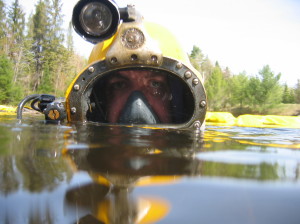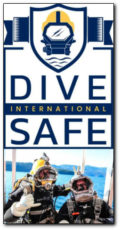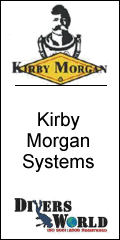Hiring the Professional Diving Contractor: The Bottom Line
By CADC Admin ~ March 27th, 2013. Filed under: Latest Diving News, Safety, Standards and Regulations.
(Reprint from CADC Mag – Spring 2013)
Employing the right underwater contractor can reduce civil and criminal liability exposure in case of accidents and affect your bottom line. Here’s what you need to know.
Employing an underwater contractor ignorant of current safety standards and regulations can expose the employer to serious (and expensive) civil and criminal liability in case of an accident. Bill C-45 of the Criminal Code of Canada states that it is the legal duty of employers and those directing work to take reasonable measures to protect employee and public safety. If this duty is disregarded and bodily harm or death results, an organization could be charged with criminal negligence. Is this a risk you and your company are willing to take?
To educate ones-self on employing a commercial diving contractor, pick up the yellow pages or do an online search for commercial diving companies. You will see it’s a competitive business—companies offering underwater services, from underwater inspections or repairs inshore to full-blown deep diving in hundreds of meters of water in the offshore. Add to this the clearance of un-exploded ordinance underwater, and you soon get the idea that special skills and safety requirements are needed to undertake the work.
Independent diving companies and members of the Canadian Association of Diving Contractors (CADC) participate in these and other activities daily. In the search for a qualified underwater services operator, are all created equal? Do they operate equally? Are you—as an employer—protected from liability should something go wrong? What standards and regulations are currently in place?
The closest thing to a common or nationally recognized diving standard cited in regulations is the Canadian Standards Associations (CSA) 275 group of Diving Standards. The CSA standards are recognized as preferred industry practice by the Federal Government’s Human Resources & Development Canada, National Energy Board of Canada and by all 10 provincial labour regulators. Regulatory compliance for occupational safety is the responsibility of each province and territory. There are jurisdictional overlaps, like Labour Canada having jurisdiction over federal government employees and the National Energy Board of Canada being responsible for the offshore.
Not all provinces enforce the same regulations. Although they may not be law, many provinces that don’t have diving regulations cite the various CSA Dive Standards in their occupational health legislation. Although the standard may not be law, if a province, territory or federal government refers to the standard in legislation, the standard does in fact become law. It can and has been used to prosecute clients, operators or supervisors if the standards are not met.
The CSA Diving standards were formulated by stakeholders in the Canadian underwater industry, with input from educators, regulators and industry users across Canada. They are reviewed annually and updated every five years.
| Canadian Standards Association (CSA) Diving Standards | |
| CSA Z275.2 refers to: | Occupational Safety Code for Diving Operations• Operational Requirements.• Minimum Crew Size.• Restrictions on Scuba.• Equipment Requirements.• Supervision.• Paperwork.• Etc. |
| CSA Z275.4 refers to: | Diver and Dive Crew Competency• The competency required for all divingPersonnel. |
| CSA Z275.1 refers to: | Chamber Standards• The requirements of HyperbaricFacilities or Decompression Chambers. |
| CSA Z275.6 refers to: | Unexploded explosive ordnance (UXO) and munitions diving. |
| CSA Z180.1 refers to: | Compressed Breathing Air Systems• Minimum allowable limits ofContaminates in breathing air.• Minimum compressor requirements. |
To the employer, the most important standards are the CSA 275.2 Occupational Safety Code for Diving Operations and the CSA 275.4 Standard on Diving Competency.
The CSA 275.2 Occupational Safety Code for Diving Operations concerns itself with operational diving safety standards—including minimum crew sizes, restrictions on the use of scuba in diving operations and equipment, supervision and medical requirements. It is important to realize that these are minimum requirements for safe diving operations and are not all-inclusive.
The CSA 275.4 Standard on Diving Competency concerns itself with the competency of the underwater worker and support personnel. This also is a MINIMUM requirement for all personnel in a diving operation meant to enhance the safety of the operation. It provides designations for competency in the occupational diving field.
It is law that we have a responsibility to ensure the safety of others. We need to be diligent in planning and executing objectives. The responsibility is not diminished by perceived extent of apparent risk. When things go wrong on a dive, consequences can be swift and severe. Making the right choices when employing diving services is the responsibility of the employer and may require managers to reassess current occupational health and safety programs to ensure compliance with regulatory requirements.
Who certifies to the CSA standards?
Provincially, certification can be provided by the regulatory authority or an authorized representative in the province.
Nationally, the federally registered, not-for-profit Diver Certification Board of Canada (DCBC) is currently the only recognized body that certifies offshore and inshore commercial divers throughout Canada. The DCBC certification is issued to commercial diving personnel who meet competency requirements of the appropriate section of the Canadian Standards Association (CSA) Competency Standard for Diving Operations (CSA standard Z 275.4).
The DCBC also accredits commercial diver training organizations which train to the competency levels described in the CSA Standard Z275.4. Such accredited organizations can assess commercial divers with experience but little or no formal training. Seven provinces and two territories cite the CSA Z 275.4 standard in their regulations. Those provinces recognize DCBC certificates as reliable evidence that the holder is competent to the CSA 275.4 competency levels.
Who complies with the CSA standards?
In many provinces, the CSA diving standards and its derivatives are law. Legally, failure to follow regulations and standards and to protect the underwater worker can result in civil and criminal charges.
When one considers the legal requirements for diving operations in Canada—and the intensive training and certification required by those involved in the industry—picking up the yellow pages and choosing a diving contactor at random is akin to playing Russian Roulette with your business or organization at the end of the barrel.
Due diligence to make sure the diving contractor is in compliance and cognisant of the occupational health and safety laws and standards within the province, protects both the owner and the underwater worker.
Members of CADC are required—once accepted into the organization’s membership—to pledge and sign-off on the following mandatory CADC membership requirement:
“As a CADC member, the company pledges to foster safety in all areas of activity; to comply with all regulations as set out by the authority having jurisdiction or—in the absence of regulations—to observe minimum standards as identified in current CSA Z275.2 Occupational Safety Code for Diving Operations + CSA Z275.4 Competency Standard for Diving Operations and Safety upgrades to the standards and amendments as approved by the Board of Directors and to maintain high standards with regard to business ethics, employee relations, and the public image of the underwater industry.”
When considering who does the underwater work, considering the employment of a professional diving services company that has earned membership in CADC and has pledged to observe safety standards and maintain high standards in business practices is a good starting point.
Hiring a member company of the CADC does not guarantee safety or high performance; there are many variables in underwater work—each company has its own high standard in operations above the minimum requirement. It’s up to the owner to make decisions as to who they should hire—and determine what the true price of hiring a low bidder or non-professional company is.
| Responsibilities | |
| Diving Contractor | Client |
| • Ensure that risk assessments have been performed. | • The scope of work has been clearly defined and agreed to by the diving contractor. |
| • The area in which work is being carried out is safe and suitable. | • Agreement has been made to provide facilities and all reasonable support in the event of an emergency. |
| • All personnel representing the diving contractor are appropriately qualified and certified. | • Consider all potential hazards that areunder their control and inform the diving contractor of these. |
| • All equipment used by the diving contractor is in good working order and, where applicable, is certified. | • Take steps to remove or reduce potential hazards as is feasible. |
| • The actual work has been assessed and a suitable plan of action has been prepared (including lock-outs) for the work to be carried out safely, effectively and efficiently. | • Ensure that sufficient time and facilities are made available to the diving contractor to carry out hazard analysis and lock-out procedures where applicable. |
| • Any site specific safety and familiarization training is provided to all personnel on the dive crew. | |
| • Project records, including dive logs, hazard analysis, and all relevant details of the project are recorded properly. | |
| • Adequate arrangements exist for first aid and medical treatment of personnel. | |
| • All relevant regulations are complied with. | |
Incidents and accidents cost money. Correctly choosing a professional contractor will translate into cost savings. The true bottom line in safety, performance and compliance to recognized industry practices and regulations is measured by the owner exercising due diligence in the selection of the contractor. Doing the homework is recognition of the clients concern for worker safety and is just plain smart business. Considering a CADC member company is a good start.
For additional information or a full list of diving contractors, see our membership list on the site. (Article by Doug Elsey CADC and John McFadzen – East Dive)








